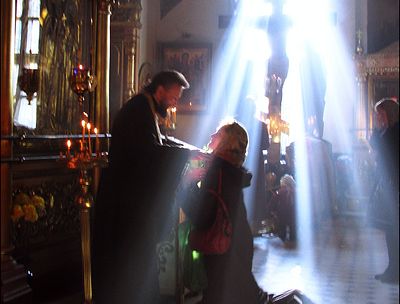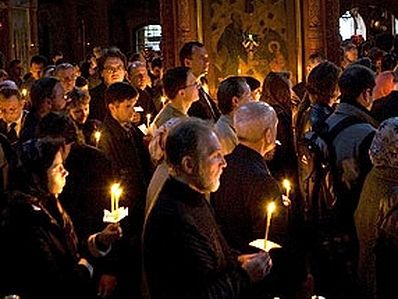Repentance is a sacrament by which those who
confess
their sins are invisibly absolved of them by Jesus Christ
Himself,
at the priest’s visible expression
of forgiveness.
Orthodox Catechesis

The Lord Jesus Christ said to His disciples, Verily I say unto you, Whatsoever ye shall bind on earth shall be bound in heaven: and whatsoever ye shall loose on earth shall be loosed in heaven (Mt. 18:18). And in another place, He breathed on them, and saith unto them, Receive ye the Holy Ghost: Whose soever sins ye remit, they are remitted unto them; and whose soever sins ye retain, they are retained (Jn. 20:21-23). Fulfilling the Lord’s will, the apostles in turn gave this authority to their successors—the pastors of Christ’s Church, and to this day, all the right-believing Christians who sincerely confess their sins before an Orthodox priest can receive through him the prayer of absolution, forgiveness, and complete remission of sins.
In this consists the essence of the sacrament of confession. In order for this sacrament to take place, the following is needed: from the penitent, sincere repentance, remorse for his sins, and the desire to abandon sin and to not repeat it; belief that the sacrament of confession has the power to absolve and cleanse away through the prayer of the priest any sins sincerely confessed; and finally, the confession must be heard by an Orthodox priest, who is the servant of Christ’s true Church, which alone preserves the fullness of grace given to us by God.
Although a Christian receives forgiveness of all his sins in the sacrament of Baptism, in his life following Baptism, during his unremitting battle with sin, he will not avoid temporary defeats, falls, and retreats influenced by outward temptations and his own passions. Therefore, every believer needs to confess his sins whenever he has the chance.
But what should especially move us to go to confession? What thoughts and reasoning call the believer to hasten to take refuge in this holy Mystery?
First of all, that spiritual torment, pain, and suffering, which every sin and transgression brings to the soul. Often the mind does not remember a sin committed, or may hardly recognize it as a sin. However, the soul remembers—it feels hell inside, it languishes and suffers, and the whole person is filled with a kind of melancholy, anxiety, and despondency. Sins and transgressions that have piled up and not been removed from the conscience (not only major sins, but also minor ones) burden it so heavily that the person begins to feel a strange sort of fear. He often does not understand the cause of all of this, but it is because he has unconfessed sins on his conscience. By God’s mercy, these sorrowful feelings remind us of those sins, so that by trying to figure out how we got into this disastrous condition of soul we would come to an awareness of the need to tear the soul from hell; that is, turn to the sacrament of confession and free ourselves through it from the torments that await at God’s dread judgment all sinners who did not purify themselves here in this life. The very fact that sin torments, burns, and wearies a person here, before the Dread Judgment, speaks for itself. This means that sin by nature torments, lacerates, bites, burns, wears out, and wears down the soul. And in the place where sinners will find themselves with their sins after the end of the world, this characteristic of sin will broaden and intensify infinitely. Thus, this wearying here, on earth, is only a soft warning, instruction, and reminder to the soul of the eternal torments of sinners.
Archimandrite Lazar (Abashidze)
Hymns in the First Week of Great Lent
“Receiving the shining rays of abstinence, O my soul, become as lightning, and flee from the obscurity of sin: that through the divine Spirit the light of forgiveness may illuminate thee as the rising sun.”
From the canon for Matins on Thursday of the First Week
“O Lord, Thou hast appointed repentance for me a sinner, wishing in Thy boundless mercy to save me though unworthy. I fall down before Thee and I pray: Humble my soul through fasting, for I flee to Thee for refuge, who alone art rich in mercy.”
Aposticha for Matins on Thursday of the First Week
“My soul, O my soul, rise up! Why art thou sleeping? The end draws near, and soon thou shalt be troubled. Watch, then, that Christ our God may spare thee, for He is everywhere present and fills all things.”
Kontakion, from the Great Canon of St. Andrew of Crete
On repentance
From that time Jesus began to preach, and to say, Repent: for the kingdom of heaven is at hand.
Matthew 4:17
What is repentance? It is the putting away of our former (sinful life) and sorrow (repentance) over it.
St. Isaac the Syrian
Everyone remember: If we do not repent, we will not be purified; if we are not purified, we will not revive in soul; if we do not revive in soul, we will perish.
Metropolitan John (Snychev)
Repentance is a celebration for God, for the Gospel says that God rejoices more over one repentant sinner that He does over ninety-nine righteous ones.
St. Ephraim the Syrian
Absolution in the Sacrament [of confession] is true absolution, no matter who performs it. For the Lord Himself hears a confession with the ears of the father-confessor, and absolves through the confessor’s lips.
St. Theophan the Recluse
There is no sin that cannot be forgiven, except for the sin that is not confessed.
St. Isaac the Syrian
True repentance requires that a person turn away from sins and worldly vanity and turn to God with his whole heart; that he change within, and become different from what he once was, and thus obtain salvation with fear and trembling, never worrying about anything other than how to please God and how to be saved. If you want to be in a state of true repentance and thus be saved, change yourself and renew yourself, become different from what you were before, and worry about nothing but pleasing God and being saved. In this way, you will become a new creature in Christ.
St. Tikhon of Zadonsk
Repentance is only true when, having felt his sins by which he has angered his Creator, a person abandons sinful action, regrets them and repents, and is made worthy of forgiveness through the grace of Christ, and through absolution by a priest of the Church. But when he does not abandon them, although he may repent it is not true repentance; it may even be a dangerous, excessive, and unreasonable hope in God’s goodness. Before God, this is judged equally to [the sin of] despair.
St. Macarius of Optina
On Repentance
By St. Ignatius Brianchaninov
 Photo: A.Pospelov / Pravoslavie.ru
Photo: A.Pospelov / Pravoslavie.ru
The power of repentance is based upon the power of God: The Doctor is all-powerful, and the treatment He administers is all-powerful. Then, during His sermon on earth, the Lord called all those sick with sin to be healed, and did not accept that any sin could be incurable. Now, He continues to call all, He promises and grants forgiveness for any sin, healing of any sinful infirmity.
Brothers! Let us look dispassionately, in the light of the Gospel, at our earthly life. It is insignificant! All its good things are taken away by death; and more often, much earlier than death by various unexpected circumstances. These corruptible, so soon disappearing good things are not worthy to be called good! They are more truly deceptions and snares. Whoever gets caught in these snares loses the true, eternal, heavenly, spiritual good things, which are obtained through faith in Christ and following Him along the mysterious path of life according to the Gospels. Repent!
What terrible blindness we are in! How obviously our falls prove this blindness! We see our brothers’ death; we know that we also, and perhaps even very soon must die, because there are no human beings who live forever on the earth. We see that many are betrayed by earthly prosperity even before death, that it often turns into the opposite—an affliction that resembles a daily taste of death. Notwithstanding this so obvious testimony of experience itself, we only chase after temporary goods as if they were permanent and eternal. All our attention is turned to these things alone! God is forgotten! Magnificent and at the same time terrible eternity is forgotten! Repent!
They will betray us, brothers. All corruptible goods will definitely betray us. The wealthy will be betrayed by their wealth, the glorious by their glory, the youthful by their youth, the wise by their wisdom. Man can obtain only one eternal, essential good during his earthly wandering: true knowledge of God, peace and unity with God, given by Christ. But in order to receive these higher goods we must abandon our sinful life; we must come to hate it. Repent!
Repent! What does it mean to repent? It means becoming aware and repenting of our sins, putting away our sins—is how St. Peomen the Great answered that question—and never returning to them. In this way, many sinners became saints, and many lawless people became righteous.
Repent! Put away from yourself not only obvious sins, such as murder, stealing, fornication, slander, and lies, but also pernicious entertainment, fleshly delights, illicit day-dreaming, and unlawful thoughts—everything that that the Gospels forbid. Wash clean your former sinful life by sincere repentance.
The establisher of repentance is Your Creator, Who created you from nothing. Therefore He can easily recreate you and reform your heart. He can make a heart that is God-loving from a heart that was sin-loving; He can make a heart pure, spiritual, and holy from a heart that was sensual, fleshly, evil-intentioned, and voluptuous.
To the measure of our feeble strength, let us respond to the Lord’s great love for us, as much as the creature is able to respond to the love of its Creator. And we are fallen creatures, at that. Repent! Let us not repent only in word; let us witness our repentance not only by a few brief tears, not only by our outward participation in Church services and the fulfillment of Church rites, which was enough for the Pharisees. Let us bring together with our tears, with our outward piety, fruits worthy of repentance: Let us change our sinful life for a life according to the Gospels.
God knew man’s infirmity. He knew that people would be falling into sins even after Baptism. That is why He instituted in His Church the sacrament of repentance, by which sins committed after Baptism are washed away. Repentance must accompany faith in Christ, and precede Baptism. After Baptism, it corrects the violation of duty by the one who has believed in Christ and was baptized in Christ.
Confession of sins breaks our friendship with sins. Hatred of sins is the sign of true repentance, and the resolve to live a virtuous life.
All sins committed in word, deed, and thought are decisively washed away through the sacrament of confession. In order to remove from the heart sinful habits that have taken root in it over a long period of time, time is needed, as well as constant abiding in repentance. Constant repentance consists in constant contrition of spirit; in struggle with thoughts and feelings by which sinful passions hidden in the heart are revealed; in restraining bodily senses and the stomach; in humble prayer, and in frequent confession.
“God’s goodness”, says the Apostle, “is leading you to repentance” (cf. Rom. 2:4). God sees your sins: He looks with forbearance and longsuffering upon the sins you have committed under His gaze; He is waiting for your repentance, and at the same time, He leaves it up to your free will to choose either salvation or death. And you abuse God’s goodness and longsuffering! Your carelessness only increases! Your disregard for God and for your own eternal lot also increases! You worry only about multiplying your sins, adding new and worse sins to your former ones! But after thy hardness and impenitent heart treasurest up unto thyself wrath against the day of wrath and revelation of the righteous judgment of God; Who will render to every man according to his deeds: To them who by patient continuance in well doing seek for glory and honour and immortality, eternal life: But unto them that are contentious, and do not obey the truth, but obey unrighteousness, indignation and wrath, tribulation and anguish, upon every soul of man that doeth evil (Rom. 2:4-9).
St. Ignatius (Brianchaninov)






